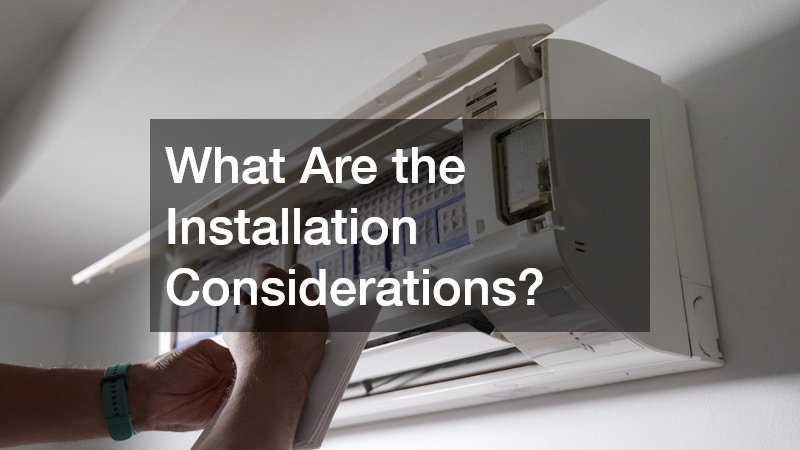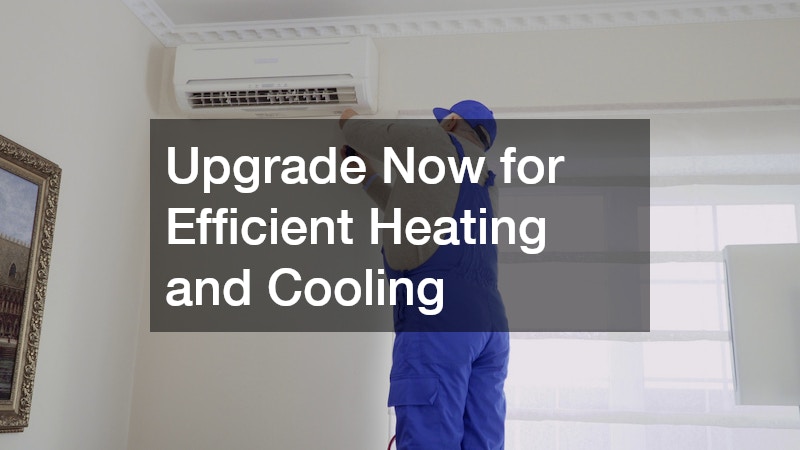If you’ve been putting off updating your home’s heating and cooling systems, it’s time to upgrade now. With energy costs rising and technology advancing quickly, homeowners have more reasons than ever to improve their HVAC systems. From better efficiency to lower monthly bills and increased comfort, the benefits of upgrading can’t be ignored.
Older systems often struggle to keep up, leading to inconsistent temperatures, higher maintenance costs, and wasted energy. When you upgrade now, you’re investing in your home’s future. Whether it’s air conditioning replacement in the summer or upgrading heating services in the winter, modern equipment works smarter, not harder.
Working with a professional HVAC contractor or local AC repair company ensures the installation goes smoothly and meets today’s efficiency standards. Plus, many homeowners don’t realize there are tax credits, rebates, and other financial incentives to help offset the cost.
In this article, we’ll explore why you should upgrade now, what systems and features to consider, how to choose the right solution for your home, and how to maintain it over the years. If you’re ready for reliable comfort and lower energy bills, let’s dive in.
Why Should I Upgrade My Heating and Cooling Systems?

Benefits of New Technology
Modern HVAC technology offers numerous advantages that older systems just can’t compete with. When you upgrade now, you gain access to smart thermostats that learn your schedule and preferences, allowing you to optimize comfort without wasting energy. Zoned temperature control means you can customize different areas of your home, reducing energy use in unused rooms. Additionally, newer units run much quieter, so your home environment is more peaceful. These features all contribute to a more comfortable living space and lower utility bills.
Cost Comparisons With Older Systems
Many homeowners hesitate to replace their old systems thinking it will save money. However, outdated HVAC units typically consume more energy and require frequent ac repairs, which can quickly add up. Investing in air conditioning replacement or updated gas and propane heating services often results in immediate energy savings and fewer breakdowns.
Environmental Impact
On top of that, upgrading now helps reduce environmental impact. Older units often use refrigerants that harm the ozone layer and emit more greenhouse gases. By switching to newer, eco-friendly HVAC systems, you can lower your carbon footprint and contribute to a healthier planet.
What Are the Best Systems Available?
Top-Rated Brands and Models
When you decide to upgrade now, selecting the right system is crucial for long-term satisfaction. Trusted brands like Trane, Carrier, and Lennox are widely regarded for their reliability and advanced technology. Working with experienced HVAC companies ensures you get a system that fits your needs perfectly, backed by strong warranties and service support.
Energy Efficiency Ratings
Efficiency ratings are key indicators of performance. Look for air conditioning units with high SEER ratings, which measure cooling efficiency, and heating systems with high AFUE ratings, which reflect fuel use efficiency. Higher ratings generally translate to lower energy bills and a smaller environmental footprint.
Features to Look For
Besides efficiency, modern systems offer innovative features like variable-speed motors that adjust output based on demand, programmable and smart thermostats for customized control, and noise-reduction technology for quieter operation. These benefits combine to improve comfort, reduce energy waste, and save money over the life of your HVAC system, making upgrading now a smart and worthwhile decision.
How Do I Determine the Right System for My Home?
Assessing Home Size and Layout
Choosing the right heating and cooling system isn’t just about picking a brand or model — it’s about finding the perfect fit for your home’s unique characteristics. Your home’s size, layout, and insulation quality heavily influence the type and capacity of the HVAC system you need. An experienced HVAC contractor will perform a detailed load calculation to make sure your system can efficiently heat and cool your entire home without being oversized or undersized, which can cause unnecessary wear or inefficiency.
Understanding Energy Needs
Energy usage patterns and existing energy bills also provide valuable insight. If you notice uneven temperatures in different rooms or an unusually high utility bill, it’s a sign that your current system isn’t meeting your needs effectively. Professionals offering heating services or air conditioning replacement can analyze your energy profile and recommend systems tailored to reduce waste and increase comfort.
Consulting With Professionals
Consulting with knowledgeable HVAC service technicians or a trusted local AC repair company early in the process ensures you’re guided through every step. They can help you understand your options clearly and ensure that your new system is installed correctly to maximize performance and efficiency.
What Are the Installation Considerations?

DIY vs. Professional Installation
While the idea of a DIY installation might seem appealing to save money, it’s important to understand that heating and AC installation require specialized knowledge and tools to be done correctly. Professional HVAC companies bring the expertise needed to handle complex systems safely, ensuring compliance with local codes and manufacturer requirements. Improper installation can lead to poor performance, increased energy bills, and frequent ac repairs — undermining the benefits of your upgrade now.
Necessary Equipment and Tools
Professional installers come fully equipped with the tools and technology necessary to handle everything from air conditioning replacement to gas and propane heating services. They manage all aspects of the process, including ductwork adjustments, electrical connections, and system calibration, providing a seamless and efficient experience.
Estimating Installation Time and Cost
Installation time can vary based on your home’s size and the complexity of the system, but most installations are completed within a day or two. When you upgrade now, reputable HVAC companies will provide clear estimates upfront, helping you plan financially and avoid unexpected costs. Clear communication about timelines and costs ensures a smooth upgrade with minimal disruption to your home life.
How Can I Maximize Efficiency After Upgrade?
Regular Maintenance and Upkeep
Once you upgrade now, keeping your system in top shape is essential for maintaining its efficiency and longevity. Scheduling regular HVAC service visits allows professionals to inspect, clean, and fine-tune your equipment, preventing small issues from turning into costly repairs. Simple tasks like clearing debris around outdoor units and checking refrigerant levels can make a big difference.
Smart Thermostat Integration
Installing a smart thermostat is one of the easiest ways to boost efficiency. These devices learn your schedule and adjust temperatures automatically, reducing energy use when you’re away and ensuring comfort when you return. You can even control them remotely from your phone, which adds convenience and control.
Insulation and Air Sealing
Additionally, don’t overlook the importance of proper insulation and air sealing. Even the most efficient HVAC system can waste energy if your home leaks air through cracks or poorly insulated walls. Working with HVAC contractors to identify and fix these weak spots will help keep your heating and cooling where it belongs—inside your home—maximizing your investment.
What Are the Financial Incentives for Upgrading?
Tax Credits and Rebates
When you upgrade now, you unlock a range of financial benefits that make the investment worthwhile. Federal and state governments often offer tax credits and rebates to encourage energy-efficient upgrades. Many HVAC companies also provide seasonal promotions or manufacturer rebates. Utility companies may even offer incentives for switching to eco-friendly systems like gas and propane heating services or high-efficiency air conditioning replacement. These programs can significantly reduce your initial costs and make upgrading more accessible.
Energy Savings Over Time
Over time, an upgraded HVAC system saves you money month after month. With lower utility bills, fewer ac repairs, and longer equipment life, the savings add up quickly. Many homeowners are surprised by how fast the system pays for itself.
Financing Options
If upfront cost is a concern, many HVAC companies offer financing plans. These allow you to spread payments over months or years, making ac installation or heating services affordable without straining your budget.
What Common Problems Might I Encounter?

Installation Pitfalls
Even when you upgrade now, some challenges can arise if the process isn’t handled properly. Improper installation is a common pitfall, which is why hiring a qualified HVAC contractor is critical. Incorrect sizing or poor ductwork can result in inefficiency and discomfort, undermining the benefits of your new system.
Maintenance Mishaps
Maintenance mistakes can also lead to premature system failure. Skipping routine inspections, ignoring filter changes, or delaying ac repairs will shorten the life of your investment. Partnering with a reliable local ac repair company for scheduled maintenance can help you avoid these issues and keep your system running smoothly.
Troubleshooting System Issues
Finally, even new systems can experience minor glitches or require adjustments. Common HVAC service issues include uneven temperatures, strange noises, or faulty thermostats. With regular checkups and prompt attention to problems, you can keep your system performing at its best.
How Do I Maintain My New System?
Scheduled Inspections
After you upgrade now, maintenance becomes essential to protect your investment and ensure it operates efficiently for years to come. Scheduled inspections are a cornerstone of this upkeep. Work with a trusted HVAC company to perform annual or biannual inspections, where professionals check for wear and tear, test components, and optimize performance.
Cleaning and Filter Replacement
Cleaning and filter replacement are equally important. Dirty filters restrict airflow, strain your equipment, and lower air quality. Make it a habit to change filters monthly or as recommended by your HVAC service provider.
When to Call a Professional
It’s also vital to recognize when to call a professional. If your system is making odd noises, running longer than usual, or failing to maintain the desired temperature, don’t wait. Contact an HVAC contractor or local ac repair company to address problems before they escalate into costly repairs or replacements.
How Do I Ensure My System Is Environmentally Friendly?
Choosing Eco-Friendly Models
If sustainability matters to you, there are many ways to upgrade now and make eco-conscious choices. Start by selecting eco-friendly models that use low-impact refrigerants and carry ENERGY STAR certification. These systems reduce emissions while delivering excellent performance.
Reducing Carbon Footprint
Reducing your carbon footprint doesn’t end with the installation. Regular maintenance, smart thermostat use, and sealing leaks around your home all contribute to improved energy efficiency. Choosing energy-saving features during ac installation or air conditioning replacement further supports the environment.
Recycling Old Units
Don’t forget about what happens to your old equipment. Many HVAC companies offer recycling services, ensuring that harmful components are disposed of responsibly. When you replace your unit, ask your HVAC contractor or local ac repair company how they handle old systems to minimize environmental impact and promote sustainability.
Are There Alternatives to Traditional Systems?

Geothermal Heating and Cooling
For homeowners interested in exploring beyond conventional heating and cooling, it’s a great time to upgrade now and consider innovative alternatives. Geothermal heating and cooling systems use the earth’s consistent underground temperatures to heat and cool your home. These systems are highly efficient and long-lasting, making them a smart investment.
Solar-Powered Units
Solar-powered HVAC units are another excellent choice. By combining solar energy with modern technology, you can enjoy comfort while reducing reliance on the grid and lowering energy bills.
Ductless Mini-Split Systems
Finally, ductless mini-split systems are becoming increasingly popular. They allow you to create separate zones in your home, offering flexibility, efficiency, and easy installation. Whether you’re looking to supplement your existing system or replace it entirely, mini-splits provide an appealing option when you upgrade now.
Conclusion
If you’ve made it this far, it should be clear why it’s the right time to upgrade now. With rising energy costs, growing environmental concerns, and rapid advancements in technology, today’s heating and cooling systems offer unprecedented efficiency, comfort, and value.
Choosing to upgrade now means saying goodbye to inefficient equipment, frequent ac repairs, and high utility bills. Whether you’re interested in air conditioning replacement, heating services, or installing a completely new HVAC system, the benefits are immediate and long-lasting.
Don’t wait until your old system fails on the hottest or coldest day of the year. Consult with an experienced HVAC contractor, explore your options with trusted HVAC companies, and take advantage of financial incentives available to you.
By working with a local ac repair company and investing in quality ac installation or gas and propane heating services, you’re making a smart, future-proof choice for your home. Upgrade now to experience year-round comfort, lower energy bills, and peace of mind knowing your home is running as efficiently as possible.


